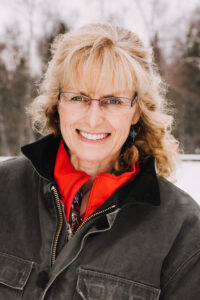
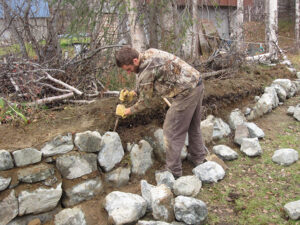
My son, Mark, built a wall. Rock by rock, he moved twelve tons of granite, to create a thing of rugged beauty. The granite, blasted into chunks at a local quarry, came back together again by the toil and hands of someone I love – a person whose lineage includes veterans who had to deal with walls of another sort.
My two grandfathers both fought in World War II. One was an American soldier. The other was a German soldier. They each served their countries on opposite sides of the war.
Family legend has it that my American grandfather, Joe, served as a driver on the Red Ball Express, a truck convoy system created in 1944 to support Allied forces battling Germany after the D-Day invasion of Normandy. The French railway system had been destroyed by Allied air power to deny the railway’s use by German forces. The truck convoy became a critical means to move supplies during the war.
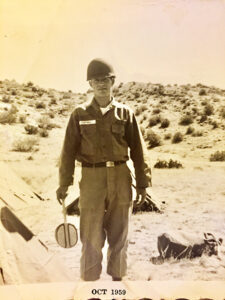
Early in the war, my German grandfather fought on the Eastern Front. Of the 70 million deaths attributed to World War II, 30 million were sustained on the Eastern Front, many of them civilians. Later in the war, Opa fought in France. The retreat from France back to the doorstep of Germany was brutal and bloody. Along with being a foot-soldier, my grandfather’s job was to care for the horses who were used to pull artillery and supplies to the wholesale carnage taking place at the front lines.
Years later, when my father, Joe Jr., enlisted in the Army, he was sent to serve in post-war West Germany. As far as Joe Sr. was concerned his son was being sent into enemy territory. As these things sometimes happen, Dad met a lovely German girl. When he made my mother his bride, the notion of bringing a “Kraut” home to meet the folks must have been awkward, to say the least. Of that union, however, came three daughters of which I am the oldest. Both of my grandfathers loved their children and their grandchildren mightily. I remember Grandpa churning homemade ice cream on the patio of their Texas home, teasing me about being strong enough to turn the handle. I watched as his working hands took over the task when my skinny arms gave out.
I remember Opa in their small German apartment, cutting up “butter-brot” in small pieces and feeding them to me as though I were a bird. His eyes brimmed with tears, and I knew even as a child that this heart was big and broken by unnamed things.
As I watched the rock wall take shape in my backyard, I thought of my sons, both of them products of my two grandfathers. They never met Joe Sr. and were too young to remember my Opa. But they each carry in them both of my grandfathers’ courage and generosity of heart. My two grandfathers never met each other, which to this day I find amazing. I have often wondered whether they needed to uphold some concept of “enemy” to rationalize the horrors they experienced during the war. I thought about the walls between countries, differing political persuasions, even the invisible walls within oneself. As my son built a granite wall, I thought about all the walls that need to come down.
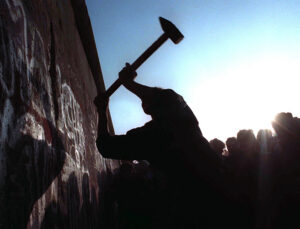
Opa never imagined that his war-ravaged country would ever be re-unified after all that had happened. Sadly, Opa passed away just months before the world beheld a spectacle. In 1989, 27 years after the Berlin Wall was built during tensions of the Cold War, the East German government at last allowed its citizens access to the West. It wasn’t enough for the gates to just open and people to pass quietly through. Germans from both sides of the wall – families, friends, and sweethearts who had been separated for decades – rushed to bring down the 96-mile-long barricade. With sledgehammers and picks, among tears, sweat, and shouts of jubilation the concrete wall crumbled. Its destruction marked a seminal moment of healing and change in the terrible gash that World War II inflicted on history.
The rocks in the wall that my son built were heavier than we realized. It took two of us pulling a sled, straining side by side, to move the rocks up to what would become the wall face. (We eventually took up a friend’s offer of a tractor.) Mark puzzled the pieces together, wrestling to stack them carefully and solidly into a curved row. My three grandchildren did their part by putting smaller rocks and pebbles in the spaces between the boulders. Such good helpers.
The wall covered a raw embankment carved during the construction of my home. It symbolized something of permanence and beauty following several years of personal upheaval and loss, a time when the entire world seemed raw and wounded.
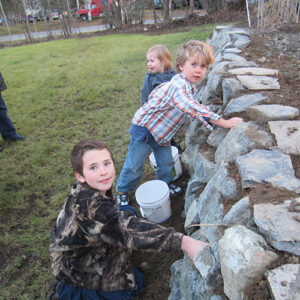
As I watched my son and my grandchildren working on the wall, I could not help but think of my grandfathers who went through their own struggles, both on and off the battlefield. It is impossible to know what they thought about meeting each other; I do not believe the effort was ever made. Yet all these years later, watching their children’s children working together, surely they both would have agreed. Love extends beyond walls of every making.
This continues to be such a relevant topic. I remember that joy when the Berlin Wall came down. And see the joy of a wall being built with love. Thanks Kaylene.
Beautiful. thank you for sharing.
I want to share a story about Dan’s father. He served in the Navy in WW2, so he was in the Pacific and the enemy there was the Japanese. His name was Kenny. He lived with us for about 2 years before he passed away. We drove a Mazda at the time. We did not think anything about it when we took him to a Japanese restaurant. When we got home he said he never would have thought that he would ride in a Japanese made car to a Japanese restaurant. He did not seem upset, but surprised at the turns in life. Our daughter Mary was in third grade and her teacher invited any persons who had been in the war to come give a talk. Kenny declined. Like many vets of that time, he never talked about the war. Mary came home smiling and said, “Grandad it is all set, you are to be at the school tomorrow at 2 to tell us about the war.” Grandad was stuck. I have wished time and time again that I would have taped that little talk he gave to her class. I was a bit nervous. Mary’s class had a number of Asian students. Kenny told us that he joined the Navy because he had never seen the ocean and thought that was his chance. Growing up in western Kansas he had also never seen anyone of Asian descent. Then he told the kids that a kamikaze attack barely missed his ship and the pilot of the Japanese airplane had to be rescued. He hurried to take a look at this “monster” who was the enemy. He said when he saw the man pulled out of the sea he saw a wet, scared 18 year old kid just like himself. I was so proud of Dan’s dad. It was such a great way to talk to the children. We really have no idea what they went through. Thank you again for your article.
I love this story every time I read it and still wish grandpa Joe and Opa could have met. I am sure that, if they still had an invisible wall within themselves, it would have come tumbling down through the common love of their shared grandchildren.
Thank you for sharing this lovely piece about your family.
Kind regards, Cole
Lovely story! It gave me the good goosebumps! Well done!